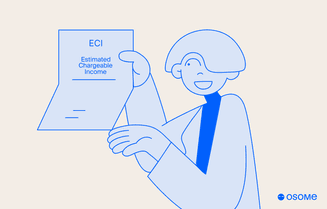A Guide to Estimated Chargeable Income (ECI) Filing in Singapore
- Published: 26 June 2024
- 9 min read
- Tax & GST


Gabi Bellairs-Lombard
Business Writer
Gabi's passionate about creating content that inspires. Her work history lies in writing compelling website copy and content, and now specialises in product marketing copy. When writing content, Gabi's priority is ensuring that the words impact the readers. As the voice of Osome's products and features, Gabi makes complex business finance and accounting topics easy to understand for small business owners.
Estimated Chargeable Income (ECI) in Singapore requires companies to declare their projected taxable profits. Filing your ECI on time is crucial to meet your tax obligations under the Income Tax Act and avoid penalties. This guide covers what ECI is, why it’s important and how to file it correctly, plus tips to avoid common mistakes.
Key Takeaways
- All Singapore-incorporated companies must file their Estimated Chargeable Income (ECI) within 90 days of their financial year end unless they qualify for exemptions.
- The ECI filing process is important not only to avoid penalties but also to get tax rebates like the CIT rebate and better financial planning, including tax planning and cash flow management.
- Common mistakes include incorrect income records and calculations. Companies can face severe penalties, including fines and imprisonment, for late or incorrect submissions under the statutory obligations laid out by the Inland Revenue Authority of Singapore (IRAS).
What Is Estimated Chargeable Income (ECI)?
The Estimated Chargeable Income (ECI) is used to forecast a company’s taxable profits for a specific Year of Assessment (YA), which affects the company’s income. It helps in planning for the company’s tax liabilities and corporate tax compliance. This is not just a number to fill in a form; it is the backbone of a company’s financial story for the year, the estimated taxable income after deducting tax-allowable expenses. The Inland Revenue Authority of Singapore (IRAS) enforces the ECI submissions to ensure businesses meet their corporate tax payable obligations and are taxed properly.
When companies declare their ECI, they must ensure that annual revenue figures are accurate and reflect the company’s actual revenue. Incorrect submissions can lead to excess payment of taxes or underpayment, resulting in penalties. Filing ECI is a statutory obligation from the Inland Revenue Authority, determining a company’s tax treatment and financial health. Failing to file an ECI correctly and on time can result in penalties from IRAS.
If you need assistance with your ECI statement, Osome offers professional services to simplify the process and ensure compliance with all tax regulations. Let Osome file ECI for you so you can focus on what you do best—running your business. Contact us now!

Understanding and forecasting your ECI is key. It’s essential for compliance, streamlining operations, and building financial resilience and foresight. Accurate filing ensures your company’s revenue is properly reported, avoiding penalties and excess payments.
Who Needs To File ECI?
All Singapore-incorporated companies must file ECI within a deadline – 90 days after their financial year-end. This applies to all companies unless they qualify for exemptions. For example, companies with annual revenue not exceeding $5 million and with NIL ECI are exempted. Foreign ship owners and certain real estate investment trusts are exempted as they are taxed under the Singapore Income Tax Act.
But it’s not just about knowing you need to file; it’s also about knowing when you can be exempt. The ECI filing waiver is a relief given to qualifying companies under specific conditions. New business owners and existing companies must understand the ECI filing requirements and seek confirmation on their eligibility for the filing waiver to avoid penalties. If you're a local shipping agent, you may have distinct tax requirements to consider.
Key Deadlines for Filing ECI
Timeliness is not just a good habit; in ECI, it’s a legal requirement. Companies must meet the IRAS deadline and file their ECI within 3 months of their financial year-end. Missing the deadline is not an option if you want to avoid trouble and stay compliant with the Income Tax Act.
There are two ways that a company files ECI: Paper-filing and e-filing. Whatever method you choose, mark your company’s financial year end on your calendar and plan accordingly to meet your statutory obligations. Ensure that you understand how to file ECI to avoid any last-minute issues before the financial year-end and stay compliant with the ECI filing requirements.
Benefits of ECI Filing
Filing your Estimated Chargeable Income (ECI) on time is not just about avoiding penalties. It’s about getting your incorporated company in good books with the Inland Revenue Authority of Singapore (IRAS) and getting real fiscal benefits. On-time filing puts you in a position to claim tax rebates like the Corporate Income Tax (CIT) rebate, which can be up to 20% of your tax payable. The CIT rebate cash grant is not to be missed.
Plus, choosing to file ECI early gives you the following:
- Tax planning: Accurate filing aids in tax planning and budgeting, ensuring your taxable profit is well-managed.
- Budgeting: It provides clarity on your company's total taxable income and helps avoid last-minute rush.
- Clarity on your tax obligations: Timely filing enhances understanding of your tax obligations and the tax treatment of various income types, such as investment income.
- Better cash flow management: It supports better cash flow management, helping you plan for any excess payment or additional tax dues.
- Avoid last-minute rush: By planning ahead, your incorporated company can avoid the stress and errors of last-minute filing.
It’s a proactive move that benefits your business, ensuring your company’s financial year ends smoothly and without complications.
Step-by-Step Guide to Filing ECI
Filing ECI? The first step is to make sure you have the ‘Approver’ status for Corporate Tax (Filing and Applications) in Corppass. With your credentials in hand, including your Singpass and your company’s Unique Entity Number (UEN), you’re ready to go. Without audited financial statements, use management accounts to declare revenue accurately, excluding non-revenue items like gains from the disposal of fixed assets, so IRAS gets an accurate picture of your business performance.

Next, file your ECI online at the mytax.iras.gov.sg portal, which simplifies the e-filing process for your company's management accounts. Understanding the ECI requirements is crucial for meeting statutory obligations laid out by the revenue authority of Singapore. Ensure familiarity with your company’s financial year and necessary tax returns to avoid penalties.
For specific cases, such as new start-up companies, investment holding companies, or real estate investment trusts, look for any specifically granted waivers or exemptions that affect your taxable profit. Engaging a tax agent can help ensure your ECI form is accurate and compliant and can help you get a tax rebate.
Need help? Osome’s professional accounting services can file ECI for you, ensuring accuracy on key components like your company's unique entity number and compliance. Contact us today to make your tax filing process effortless and stress-free!
ECI Filing Mistakes To Watch Out For
When filing ECI, don’t get caught by inaccurate income records and incorrect calculations that can lead to an incorrect ECI declaration. Verify all pre-filled information to ensure it reflects your company’s current situation and total taxable income.
It’s a myth that if your revenue has already been reported to IRAS, you can skip ECI requirements. The revenue declared in an ECI form must align with the audited financial statements, although no revision is needed if ECI remains the same. Be vigilant and precise to ensure your ECI submission is accurate, avoiding any discrepancies with the company’s financial year-end figures.
Late or Incorrect ECI Filing Penalties
The penalties for missing the filing deadline are not just a slap on the wrist. If ECI is not filed within the timeframe, IRAS can issue an estimated notice of assessment, which could be higher than your actual tax liability. The Notice of Assessment (NOA) is deemed correct, and the tax must usually be paid within a month of the notice.
General non-compliance can lead to fines up to $5,000 and/or 3 years imprisonment. For those with the intention to evade taxes, the storm gets worse with penalties up to 400% of the undercharged tax and a $50,000 fine and/or 5 years imprisonment.
How To Calculate Your Company's ECI
Calculating your Estimated Chargeable Income (ECI) is like navigating through financial currents. Here are the steps:
- Start with your primary income, which is your core business activity.
- Add other income, such as property gains or investment income.
- From this total, deduct tax-allowed expenses and capital allowances to get your taxable revenue.
Remember the exclusions and inclusions that can affect your ECI. Here are some to note:
- Disallowable expenses should be added back to the net profit.
- Source income should be removed before tax calculation.
- Tax exemption for new start-up companies or partial tax-exempt amount should not be included in the ECI calculation.
The goal is to get your taxable revenue as accurate as possible so you can sail smoothly during tax time. Consider the tax exemption scheme, such as the partial tax exemption scheme, to ensure your company's estimated taxable profit is accurate.
ECI Payment Options
Paying Estimated Chargeable Income (ECI) doesn’t have to be a rough ride. Flexible payment options are available to companies. Installment plans, for example, allow businesses to spread their tax payments so large sums become more manageable.

By taking advantage of these options, companies can manage their finances better and focus on the bigger picture. Companies can use their management accounts to plan their tax payments, ensuring they are in compliance with the tax return form requirements.
Advantages of Early ECI Filing
Starting your ECI journey earlier than required has its advantages. Filing your ECI before the deadline not only allows you to get GIRO instalment plans but also gives you a clearer view of your taxable income and upcoming tax liabilities. This early move means better cash flow management so you can allocate your resources better throughout the year.
Plus, by filing early, you:
- avoid the chaos of last-minute filing and the errors that come with it
- have peace of mind knowing your taxes are settled ahead of time
- free yourself to focus on steering your company to profitable waters without the anchor of tax uncertainty holding you back.
Why Outsource ECI Filing?
In business, sometimes you have to delegate tasks to navigate better. Outsourcing the ECI process to professional tax consultants like Osome can free you from the technicalities of tax compliance so you can focus on business growth. These experts will be your watchful eyes, ensuring your tax is in order and will respond to IRAS queries promptly.
Plus, outsourcing firms offer:
- They are updated with the latest tax changes so your business gets informed advice to prevent compliance mistakes.
- By entrusting this important task to experienced professionals, you save time and resources.
- You have peace of mind knowing your company's ECI filing status is in good hands.
Conclusion
From understanding the basics of Estimated Chargeable Income (ECI) to calculating ECI and the benefits of early filing and outsourcing, this article has broken down the ECI process in Singapore. With this guide in hand, you’re ready to sail the fiscal waters confidently, have your business compliant with the revenue authority of Singapore, and be prepared for future growth.
FAQ
What is the deadline for filing ECI in Singapore?
ECI is to be filed within 90 days after your company’s financial year-end. Don’t miss this deadline, as late filing can increase the odds that your company fails to avoid penalties and is struck off by IRAS. Filing on time allows for better planning and avoids last-minute stress.
Are there penalties for late ECI filing?
Yes, late filing can lead to serious consequences such as IRAS estimated assessments, fines, and, in extreme cases, imprisonment. File your ECI on time to avoid these penalties, maintain your company’s reputation, and ensure smooth financial operations. Delays can also add to administrative burdens and disruptions to your business, affecting how the company’s financial year ends.
Can I pay my company's ECI in instalments?
Yes, you can pay your ECI in instalments if you file early and qualify for the GIRO instalment plan. This option helps you manage your cash flow better by spreading the tax payments over several months. Apply for the instalment plan as soon as possible to enjoy this benefit and ease the financial burden on your company.
What should I include in my company's ECI calculation?
You should include the main income, other income, expenses, and capital allowances. These will give you a full picture of your company’s financials and ensure your tax liability is accurately estimated. Proper accounting for all these is crucial for compliance and tax planning. Ensure these details are reflected in your income tax return form.
Is outsourcing ECI filing beneficial for my company?
Yes, outsourcing the ECI filing process is beneficial for your company. It saves time, ensures tax compliance, and allows you to focus on growth and development. Professional services like Osome provide expertise and peace of mind, ensuring your ECI is accurate and on time. This also helps identify tax savings and manage overall finances efficiently, particularly for new start-up companies and investment holding companies.
Get expert tips and business insights
By clicking, you agree to our Terms & Conditions, Privacy and Data Protection PolicyWe’re using cookies! What does it mean?






